L8: breaking the rules - clientelism and corruption
1/42
There's no tags or description
Looks like no tags are added yet.
Name | Mastery | Learn | Test | Matching | Spaced |
|---|
No study sessions yet.
43 Terms
Democracy promotes broader development by
accountability for politicians in enforcing the rules and delivering development
Credibility for the protection of (property) rights
Are there any developmental tasks democracies are particularly bad at?
Short-term bias
An electoral cycle
A concrete bias
*Speed of reaction —> less decisive, slow reactions
Gaining consensus, decision making is just a slower process as it needs to be agreed upon by more branches or people
development tasks democracies are bad at: short term bias
Even well-meaning politicians need to worry about re-election in 4 years' time
Less attention to climate change, pensions for ageing populations
Commitment problems: Why invest now if my successor might cancel it?
Especially as successors prefer to claim credit for their own ideas
What policy makes sense depends on when the next election is
There needs to be benefits during the election period bc otherwise you most likely wont be elected
Picture: Policy B = an investment
Could be climate change —> green living
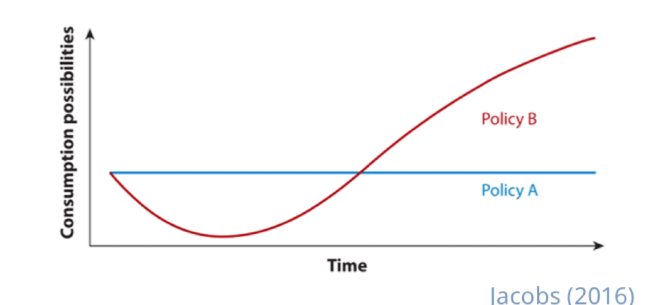
development tasks democracies are bad at: Electoral cycle
Voters remember recent events more sharply
Things that happened a long time ago people wont remember and politicians know this —> use this to their benefit
So politicians concentrate their investments and stimulate the economy just before an election
Unpaid electricity bills spike by 3% points in election years in Uttar Pradesh, India
Forbearance to consumers and businesses for electoral support
Ex. Politicians might not be so eager to force people to pay up during election times, so they will be happy with the regime at the time of election —> forbearance inline with election periods
Picture: Spending on social protection is higher at elections, goes down during the regime and then back up again the next election
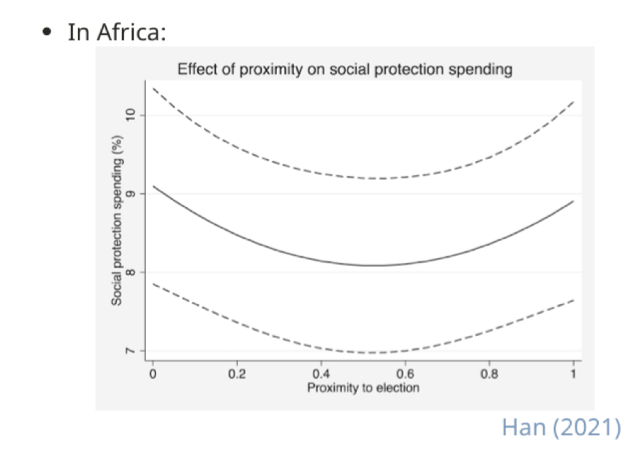
development tasks democracies are bad at: concrete bias
Development requires many 'hidden' inputs, eg. teacher training, management, oversight, maintenance
But politicians invest only in what voters can see and reward: Concrete buildings, ribbon-cutting events
Democratization in Africa led to the abolition of school fees and many more children in schools, but no investment in quality
These are things a parent and voter will feel —> more money in pocket, kids in school
But quality stayed the same —> weren’t able to handle the increased amount of kids being sent to school
Quantity over quality bc politicians will get credit for more kids in school but wont matter to them if those kids are actually getting a useful education
Clientelism
The contingent exchange of material benefit for political support
Citizens gain material benefits
Politicians gain political support
Most common —> votes
Clientelism explanation
Rules for neutral distribution exist on paper
Eg. everyone has a right to healthcare
But are broken/twisted in practice
Bureaucrats, politicians use discretion to control access
Even if you have a right to it, politicians can block bc they didn’t vote for them → use brokers to know who it voting for who
Local Brokers monitor who you support/vote for
Access to healthcare depends on who you vote for
A 'quid pro quo' between patron and client; an unequal exchange
Varieties of clientalism
patronage
Vote-buying
Relational
Patronage clientelism
Distributing public jobs To friends or supporters (the opposite of autonomy/meritocracy)
Vote-buying
Gifts, cash or services for votes
Relational clientelism
Long-term ties of trust between parties and voters
Example of clientelism
motorbike taxi drivers lined up to get cash from candidate (striped orange and black shirt) to buy their votes and support

How does clientelism affect development?
Can have benefits but is generally harmful to development
Harms public services
Private over public goods
Less autonomy
Lack of accountability
Property rights protection less credible
Clientelism affect development: public goods
private goods over more efficient public goods
handouts instead of infrastructure
Can’t control public goods
Clientelism affects development: less autonomy
a patronage bureaucracy has less autonomy
in Brazil, students test scores get worse when a new party replaces teachers
Education suffers bc of patronage
Clientelism affects development: lack of accountability
Voters must vote for their patron, not the best candidate
Inverts democratic accountability
Normally voters hold politician accountable
Clientelism leads to politicians holding voters accountable —>are they voting for them
Clientelism affects development: less credible
property rights protection is less credible
in Côte d’Ivoire, land rights depended on who you voted for
Who is to blame for clientelism?
bureaucrats
Voters
Who is to blame for clientelism? Bureaucrats
Donors often use aid to do 'capacity building' to reduce clientelism
Training for bureaucrats
New IT system
Revising institutional rules
New organizations
But capacity building just makes bureaucracies more efficient at clientelism
The political incentives haven't changed
More skilled but still have the same politics
Politicians fault?
who is to blame for clientelism? Voters
voters do demand clientelism
Relational clientelism → many demands on their politicians so they fold and give them what they want
Voters are demanding it bc the system is failing them
What is the alternative?
Voters know if you promise good governance, infrastructure and good education, politicians wont deliver → no good credibility
Have never seen it happen
They know that they will get the bag of rice so that is what they ask for
Clientelism keeps them alive → no ones fault individually
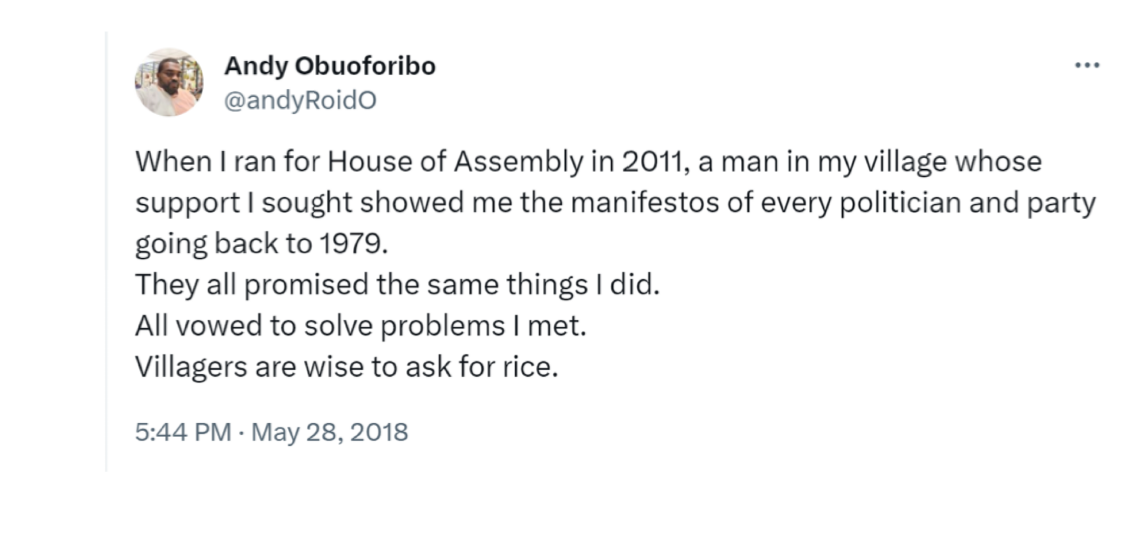
Programmatic politics
the opposite of clientelism
Politicians offer distinct programs: policies and public goods
Can target groups of citizens, eg. women, the poor
Based on their objective socioeconomic characteristics
Not their political behaviour
Programmatic politics: Mexico social development programs example
Pronasol
more people voted for it bc you would not get it if you didn’t
Progresa
less voted, but more people actually got the benefits of the program

How does democracy affect clientelism?
Democracy encourages programmatic parties and broad appeals using public goods
Eg. the PAN in Mexico
The Workers' Party (PT) in Brazil
OR
Democracy creates 'competitive clientelism'
Instead of clientelism disappearing , they are competing → accelerated
Democracy in Africa has had a different effect : Nigeria, Kenya
An incumbency advantage in resources for clientelism
*Programmatic is better for development but how we get it is not straight forward
how does democracy affect clientelism? Mexico example
democratization led to more programmatic social policies
The state had the capacity to deliver and monitor Progresa/Oportunidades → centralized
Threat of violence if clientelism continued - Zapatista Rebellion → led to an actual resolution of poverty
The opposition controlled the legislature so could constrain the government's discretion → balance of power
Corruption
the misuse of public power for personal gain
personal gain = economic and/or political
Examples
bribery
Extortion
Fraud
Kickbacks
Collusion
2 types of corruption
Petty
Grand
Petty corruption
Systematically spread in many countries —> ‘normal’
Smaller amount for each bribe (5-100 dollars)
Bribes to police to pass a roadblock
Bribes to get a driving license faster
Average payment is twice the official price in
India (Bertrand et al 2008)Drivers don't really take the exam → Unsafe drivers
Once you have paid, you get the license - don't take the test bc they have already gotten the license
Grand corruption
How do you get money out of gov and into our personal pockets
Millions of dollars
'Carwash' ('Lava Jato') in Brazil: contractors for Petrobras colluded on how much to bid, raising prices and channeling >US$2bn to politicians
Goldenberg in Kenya: Fake importing of US$1bn of gold and diamonds paid for by Central Bank to finance election campaign
Anglo-Leasing in Kenya: $740m in Up-front payments for security services never delivered;
redirected to politicians1MDB in Malaysia: US$4.5bn Made to promote investment in Malaysia → used as front to launder money
Channeled back to the prime minister and their party
Truong My Lan in Vietnam: US$44bn of loans, 93% of Saigon Commercial Bank's lending, to its main owner to buy real estate
Corruption harms development
Wasting scarce resources
Discouraging investment and merit
Weakening institutions
Undermine trust
Corruption harms development: wasting scarce resources
US$3.6tr per year, 5% of global GDP
Uganda 1991-95: Only 13% of budgeted funds reach schools
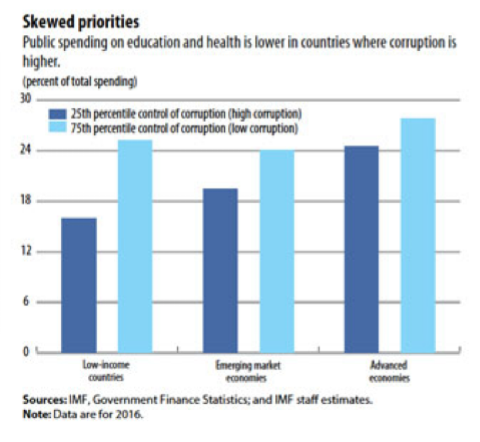
Corruption harms development: discouraging investment and merit
Corruption demands prevent construction being completed (or started)
Bureaucrats pay for jobs where they can be corrupt (Wade 1982)
If you know it will be stopped, you wont invest → too high a risk
Same for international and national investment
Corruption harms development: weakening institutions
By definition, corruption is rule-breaking
How you're financed → how you govern
Eg. Bangladesh Rana Plaza collapse 2013 - corruption led to safety standards being violated
Had 4 stories more than it was premiered to have, no escape routes, wrong building materials → happened bc bribed people checking for safety
Forbearance
Corruption harms development: undermining trust
Gov is benefiting and the people are not
Green line is trust in gov —> less likely to pay taxes, get vaccinated, etc
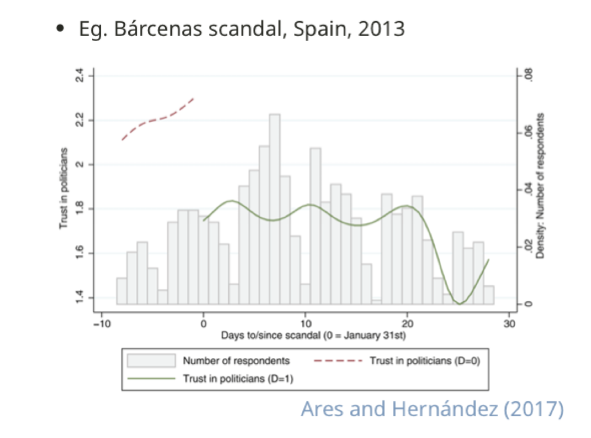
Where does corruption come from?
But Corruption may be a symptom of weak institutions and a weak state
Rather than a root cause
Anti-corruption campaign can lower it, but wont get to the rooted cause
Root cause = weak institutions and weak state
Not about bad people but bad systems and institutions
Corruption is useful for citizens in developing countries to address systemic problems:
Corruption is useful for citizens in developing countries to address systemic problems:
Can help protect property rights
Corrupt politicians have more power for enforcement
Financing electoral campaigns
Informal institution that is normalized
Corruption useful to citizens: help protect property rights
paying off the police secures your investment
Fast development in Bangladesh only possible bc of corruption
None of the industries and jobs it created would be there without corruption
Corruption useful to citizens: corrupt politicians have more enforcement power
Being tough/corrupt can help deliver projects where there's no embedded autonomy
Voters support corrupt candidates
Why? Corrupt politicians get things done!
If 10% is stolen, what happens to the 90%?
Either nothing happens with it → stays in bank
OR it is used to develop →build the road or whatever is the cover for the stolen 10%
Option between not corrupt and nothing gets done OR corruption and things do change
Corruption useful to citizens: financing electoral campaigns
Essential to political competition where there's no public funding
Electoral cycles in corruption
Politicians need lots of cash in the weeks before an election
In Russia, sourced from firms with public procurement contracts
corruption useful to citizens: informal institution becomes normalized
Practicing corruption isn’t seen as bad → it is how citizens survive
Petty corruption is moralized
Okay to pay a bribe bc that is how the system works
Systemic → follow system
More than a third of people in Mexico and Nigeria say that other people believe it is okay to pay a bribe
Challenging corruption is challenging a social norm —> hard to do
Does anti-corruption work?
If corruption is a social norm and systemic then most likely no
Strict formal rules don't change systemic norms/incentives
Can a corrupt system reform itself?
Strong incentives for isomorphic mimicry
Targeting corruption may do nothing to strengthen the underlying institution/state
despite decades of anti-corruption projects in sub-Saharan Africa
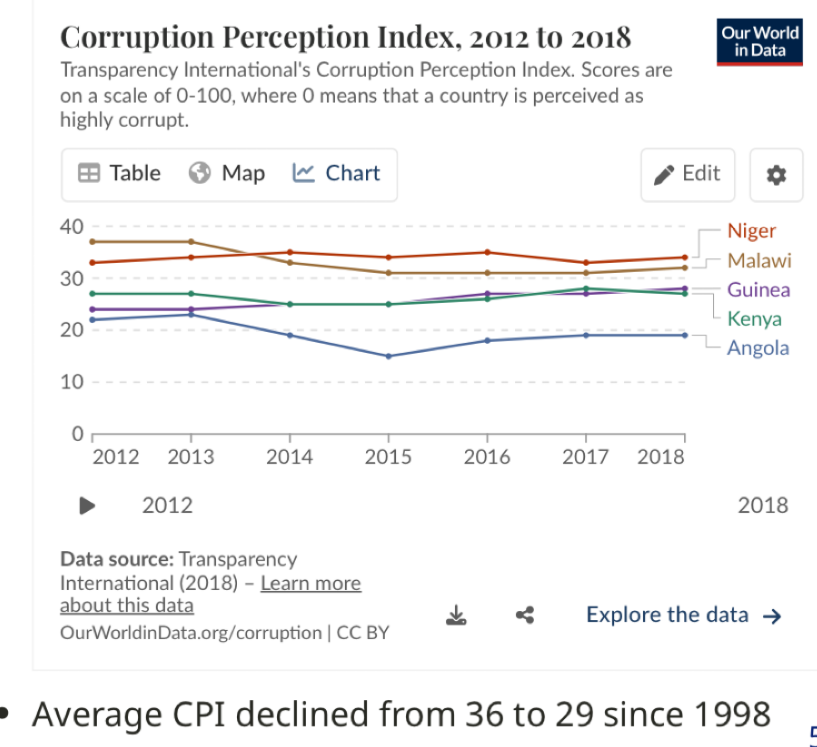
Corruption can be compatible with development
'Corrupt' countries can develop quickly, eg. China, the West
If investment happens despite corruption
The corrupt have their investments protected
The people investing protected by gov?
If the weakness of the state and institutions is addressed by deeper political processes
The West got rich through corruption, violence
These shows (Peaky Blinders, Gangs of New York) show peak industrial times in the West → through corruption
does democracy increase corruption?
New democracies have weak institutions:
More competition → More electoral financing needed → More corruption
Authoritarian Kenya was less corrupt because leaders limited corruption to 'enlarge the pie' (Mwangi 200
Democracy makes corruption 'visible': NGOs and Free Media
Undermining legitimacy
In consolidated democracies:
Active anti-corruption agencies with autonomy
Institutions and the rule of la w are strengthened with a rich state
Free media, free speech, civil society are effective
Informal institutions (social norms) against corruption
Summary
1. Electoral Distortions
Even if democracy boosts social services overall...
Short-termism, electoral cycles and a 'concrete' bias harm the quality and sustainability of development
2. Clientelism
Buying votes harms accountability and weakens public services
Programmatic politics reduces poverty but relies on specific types of democratic competition
3. Corruption
Discourages investments and weakens institutions
But may just be a symptom of weak institutions and a weak state
Eliminating corruption is not necessary or sufficient for development